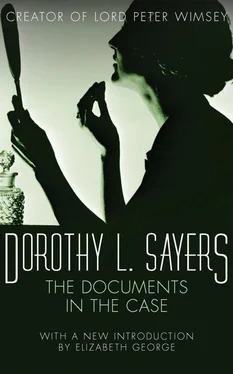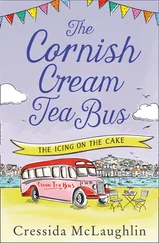Dorothy Sayers - The Documents in the Case
Здесь есть возможность читать онлайн «Dorothy Sayers - The Documents in the Case» весь текст электронной книги совершенно бесплатно (целиком полную версию без сокращений). В некоторых случаях можно слушать аудио, скачать через торрент в формате fb2 и присутствует краткое содержание. Жанр: Классический детектив, на английском языке. Описание произведения, (предисловие) а так же отзывы посетителей доступны на портале библиотеки ЛибКат.
- Название:The Documents in the Case
- Автор:
- Жанр:
- Год:неизвестен
- ISBN:нет данных
- Рейтинг книги:5 / 5. Голосов: 1
-
Избранное:Добавить в избранное
- Отзывы:
-
Ваша оценка:
- 100
- 1
- 2
- 3
- 4
- 5
The Documents in the Case: краткое содержание, описание и аннотация
Предлагаем к чтению аннотацию, описание, краткое содержание или предисловие (зависит от того, что написал сам автор книги «The Documents in the Case»). Если вы не нашли необходимую информацию о книге — напишите в комментариях, мы постараемся отыскать её.
The Documents in the Case — читать онлайн бесплатно полную книгу (весь текст) целиком
Ниже представлен текст книги, разбитый по страницам. Система сохранения места последней прочитанной страницы, позволяет с удобством читать онлайн бесплатно книгу «The Documents in the Case», без необходимости каждый раз заново искать на чём Вы остановились. Поставьте закладку, и сможете в любой момент перейти на страницу, на которой закончили чтение.
Интервал:
Закладка:
I crossed on the 2nd, and came down here for warmth and sunshine (what a hope!). The place has been ruined, of course, by ‘artistic’ tourists, and is lousy with Ye Olde Potterye Shoppes. The brave fishermen dangle around in clean blue jerseys and polish up the boats in the harbour, while they long for the film-season to start again.
I shall be back in Bayswater some time next week. I hope your sense of humour is feeling robust, for I am in a foul mood and nothing pleases me.Yours ever, Lathom
27. John Munting to Elizabeth Drake
15a, Whittington Terrace, Bayswater
[The opening sheets of this letter are lost, but the date is evidently some time in January.]
. . proofs coming along at express speed, I am enjoying a magnificent illusion of importance and busy-ness. The novel will be out before the Life , which is being held up considerably by copyright bothers over the plates. All the better, as it is a mistake to bung two books out right on top of one another.
I am feeling a great deal more sympathetic with Lathom just now. The earnest Harrison has transferred his attentions, for the moment, to me, because, as a literary man, I can, of course, tell him exactly how best to prepare his fungus-book for the press. He comes teetering in at my busiest moments to discuss points of grammar. I tell him my opinion and he contradicts it at great length, pointing out subtleties in his phrasing which I have not grasped. At length I either tell him that his own original idea expresses his personality best, or fall back on The King’s English if the error is really too monstrous to let pass. This works all right for a time, and he carries the book off with much gratitude — returning later, however, with the demurrer to Mr Fowler carefully written down on paper. I once made the foolish suggestion that he should write to Fowler and thrash it out with him direct; this was fatal, as I had to listen to ( a ) the letter; ( b ) the reply; ( c ) the rejoinder — so I now fall back as a rule on the phrase about expressing personality. There was also a dreadful day when a water-colour picture of fungi came out too green by three-colour process. Lathom and I suffered dreadfully over this abominable toadstool, and were at length forced to go out and drown the recollection in Guinness.
All the same, I try my best to be helpful, because I am the only person who can enter into Harrison’s interests, and he has really written a very entertaining little piece of work, full of odd bits of out-of-the-way knowledge, scraps of country lore and queer old-fashioned recipes and things. He must have made extraordinary good use of his holidays, and there’s not a plant or animal in the country fit for food that he doesn’t know the last word about. He has made a wonderful collection of botanical diaries, which ought to be of considerable scientific value, and he brings a really scholarly mind to his rather unscholarly subject. His water-colours, though too prim considered as pictures, make really rather attractive book-illustrations, and his drawings of plants and fungi are beautifully accurate in line and colour — far better than the stuff you find in the usual textbooks. And, indeed, the vagaries of the three-colour process are enough to make Job irritable. I told him that he should take as his motto for the book the famous misprint in the Bible, ‘Printers bave persecuted me with a cause’ — which pleased him.
Profiting by my position as literary guide and mentor, I have (with colossal tact) persuaded him to let the famous portrait be shown. We got around to it by way of cookery, oddly enough. I said that cookery was really a very important creative art, which was not properly understood in this country, being chiefly left in the hands of women, who were not (pardon me, Bungie) as a rule very creative.
That led on to a general discussion of Art, and the yearning that every creative artist feels to obtain a public response to his art. And so, by devious ways, to Lathom and his picture. I said that, while I entirely understood Mrs Harrison’s quite natural feeling that to exhibit her portrait would be, to a great extent, exhibiting herself, to Lathom it was, of course, quite a different matter. It was his work, his handling of line and colour, for which he wanted public recognition. But I admitted that a woman could not be expected to appreciate this point of view.
As I had foreseen, Harrison took this as an indirect criticism of his wife, and promptly reacted against it. She was not, he said, like the ordinary woman. She had a remarkable gift for artistic appreciation. He felt sure that if he put it to her in the right light, she would see that it was not a personal question at all. Indeed, she had made no objection herself — it was he who had been afraid of exposing her to unwelcome notoriety. But it should be made quite clear that the painting was the important matter, and that the subject had no personal bearings of any kind.
It was very odd, Bungie, to see him reassuring himself in this vicarious way. And it was still odder that I had a feeling all the time as if I was doing something unfair. His attitude about the thing was preposterous, of course, but I have a queer feeling about Mrs Harrison. She isn’t so stupid that she can’t see Lathom’s point of view. It would matter less if she were. It is that she is clever enough to see it and adopt it when it is pointed out, and to make it into a weapon of some kind for something or other. Not knowing that it is a weapon, either; practising a sort of ju-jitsu, that overcomes by giving way — good God! what a filthy bit of obvious journalese metaphor!
Anyhow, Mr Harrison worked off my little lecture on the creative artist with great effect under my very nose the same evening, as though it was all his own work. Mrs H. started off with her usual lack of tact by saying: ‘I thought you said,’ and ‘I don’t want to discuss it,’ but, catching my eye, resigned herself to listen graciously and give consent. So the Hanging Committee is, after all, to have the happiness of gazing upon the portraits of Mrs Harrison and Miss Milsom — blest pair of sirens — and I hope they will be duly appreciative. Lathom is pleased — and so damn well ought to be! I hope it will calm him down, for what with the portraits and the fungus-book and one thing and another, he and I are both getting into a state of nerves.
I want peace and quiet . Damn all these people! Thank Heaven I’ve got the proofs to see to, because I’m in no fit state to write anything. My ideas are all upside down. I can’t focus anything. I suppose it’s just the usual ‘between-books’ feeling. I am going to take a few weeks’ lucid interval and read astronomy or physics or something. Personally, I’m dead sick of the blasted creative instinct!Yours all-of-a-dither, but still devotedly, Jack
28. The Same to the Same
15a, Whittington Terrace, Bayswater 1st February, 1929
Bungie, my darling,
What, in God’s name, are you going to do with me if I get jealous and suspicious? Or I with you, if it happens that way? I ask this in damn sober earnest, old girl. I’ve got the thing right under my eyes here, and I know perfectly well that no agreement and no promise made before marriage will stand up for a single moment if either of us gets that ugly bug into the blood.
You remember — months ago — I passed on a cheerful little matrimonial dialogue that took place by the umbrella-stand. Tonight we had the pleasure of hearing the thing carried on to the next stage.
Harrison had the brilliant idea of inviting Lathom and me to dinner to taste his special way of frying chicken. Well, there we all were — Miss Milsom frightfully kittenish in a garment she had embroidered herself with Persian arabesques. (‘I don’t know what they mean, you know, Mr Munting. Probably something frightfully improper! I copied them off a rug.’) Harrison who allows nobody to penetrate into ‘his’ kitchen when he’s working out a masterpiece, was frying away amid a powerful odour of garlic. No Mrs Harrison! We furiously make conversation — enter H. — gives a black look round, and disappears again. I count the things on the mantelpiece — two brass candlesticks, brass door-knocker representing the Lincoln imp — two imitation brass mulling-cones — ill-balanced pottery nude — quaint clock and pair of Liberty nondescripts. Front door goes. Kitchen door in the distance heard to burst open. ‘Well, where have you been?’ Awful realisation creeps over us all that the sitting-room door has been left open. I say hurriedly: ‘Have you read the new Michael Arlen, Miss Milsom?’ We are all aware that a prolonged cross-examination is proceeding. Lathom fidgets. Voice rises to appalling distinctness: ‘Don’t talk nonsense! How long were you at the hairdresser’s? — Well, what were you doing? — Yes, but what kept you? — Yes, of course, you met somebody. You seem to be meeting a lot of people lately! — I don’t care who it “only” was — one of the men from the office, I suppose — Carrie Mortimer? nonsense! — I shall not be quiet — I shall talk as loudly as I like — Did you or did you not remember —?’ Here I grow desperate and turn on the gramophone. In comes Harrison, putting a good face on it. ‘Here’s the wife, late as usual!’ We sit down to dinner in embarrassed silence. I murmur eulogies on the chicken. ‘Over-cooked,’ says Harrison, shovelling it all aside and savagely picking at the vegetables. After this, everybody is afraid to eat it, for fear of not seeming to know good food from bad. ‘It seems delicious to me, Mr Harrison,’ says Miss Milsom, profiting nothing from long experience. ‘Oh,’ says Harrison, sourly, ‘you women don’t care what you eat. It’s overdone, isn’t it, Lathom?’ Lathom, quite helpless with rage, says in a strangulated voice, that he thinks it’s just right. ‘Well, you’re not eating it,’ says Harrison, gloomily triumphant. By this time everybody’s appetite is taken thoroughly away. There is nothing on earth the matter with the chicken, but we all sit staring at it as though it was a Harpagus-feast of boiled baby.
Читать дальшеИнтервал:
Закладка:
Похожие книги на «The Documents in the Case»
Представляем Вашему вниманию похожие книги на «The Documents in the Case» списком для выбора. Мы отобрали схожую по названию и смыслу литературу в надежде предоставить читателям больше вариантов отыскать новые, интересные, ещё непрочитанные произведения.
Обсуждение, отзывы о книге «The Documents in the Case» и просто собственные мнения читателей. Оставьте ваши комментарии, напишите, что Вы думаете о произведении, его смысле или главных героях. Укажите что конкретно понравилось, а что нет, и почему Вы так считаете.












